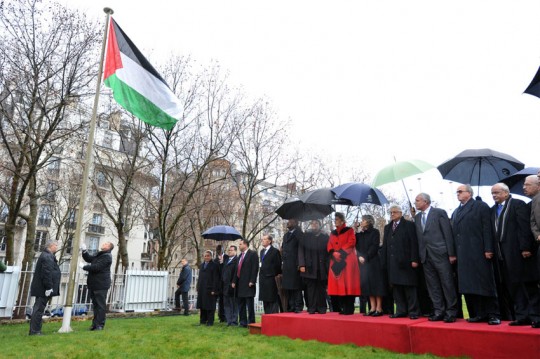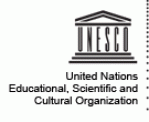Palestinian flag flies at UNESCO to mark admission as new member
Palestinian flag flies at UNESCO to mark admission as new member
 Palestinian flag raised at UNESCO Headquarters in Paris, France
Palestinian flag raised at UNESCO Headquarters in Paris, France
The Palestinian flag was raised for the first time at the Paris headquarters of the United Nations Educational, Scientific and Cultural Organization (UNESCO) today as the UN agency marked Palestine’s admission as a full member.
Senior UNESCO officials and Palestinian Authority President Mahmoud Abbas attended the ceremony, which follows the decision of the agency’s General Conference on 31 October to admit Palestine as UNESCO 195th member.
Membership took effect on 23 November after Palestine signed and accepted the agency’s constitution in London. UNESCO thus became the first UN agency to admit Palestine as a full member.
The Palestinian people, as all peoples, must be able to preserve their culture and heritage. They must benefit from quality education, education for peace.
In remarks welcoming Palestine to the agency, UNESCO Director-General Irina Bokova noted that membership “goes beyond raising the flag” and includes critical rights and responsibilities, as well as the sharing of universal values such as tolerance and respect for others.
“Membership allows a country to bring to the world that which it cherishes most – the wealth of its culture, the resonance of its dreams for mutual understanding,” she said.
“The Palestinian people, as all peoples, must be able to preserve their culture and heritage. They must benefit from quality education, education for peace. A strong educational system teaches respect for human rights. A vibrant culture respects the culture of others. In this connected world, healthy societies flourish through ties with others. UNESCO stands for all of this.”
Ms. Bokova stressed that “multilateralism has never been so important. This must be a chance for all to join together around shared values and renewed ambitions for peace.”
In his address to assembled delegations and guests, Mr. Abbas said the admission to UNESCO was “a tremendous source of pride to us… Palestinian writers, artists and researchers have played a vital role trying to preserve the culture and identity of our people. UNESCO has also played a fundamental role – and has been a loyal partner.”
Today’s ceremony was also attended by Katalin Bogyay, the President of UNESCO’s General Conference, and Alissandra Cummins, the Chairperson of the agency’s Executive Board.
###
About UN Educational Scientific and Cultural Organization (UNESCO)

UNESCO works to create the conditions for dialogue among civilizations, cultures and peoples, based upon respect for commonly shared values. It is through this dialogue that the world can achieve global visions of sustainable development encompassing observance of human rights, mutual respect and the alleviation of poverty, all of which are at the heart of UNESCO’S mission and activities.
The broad goals and concrete objectives of the international community – as set out in the internationally agreed development goals, including the Millennium Development Goals (MDGs) – underpin all UNESCO’s strategies and activities. Thus UNESCO’s unique competencies in education, the sciences, culture and communication and information contribute towards the realization of those goals.
UNESCO’s mission is to contribute to the building of peace, the eradication of poverty, sustainable development and intercultural dialogue through education, the sciences, culture, communication and information. The Organization focuses, in particular, on two global priorities:
- Africa
- Gender equality
And on a number of overarching objectives:
- Attaining quality education for all and lifelong learning
- Mobilizing science knowledge and policy for sustainable development
- Addressing emerging social and ethical challenges
- Fostering cultural diversity, intercultural dialogue and a culture of peace
- Building inclusive knowledge societies through information and communication
###
> United Nations (UN).
 The United Nations was established on 24 October 1945 by 51 countries committed to preserving peace through international cooperation and collective security. Today, nearly every nation in the world belongs to the UN: membership totals 192 countries.
The United Nations was established on 24 October 1945 by 51 countries committed to preserving peace through international cooperation and collective security. Today, nearly every nation in the world belongs to the UN: membership totals 192 countries.
When States become Members of the United Nations, they agree to accept the obligations of the UN Charter, an international treaty that sets out basic principles of international relations. According to the Charter, the UN has four purposes:
- to maintain international peace and security;
- to develop friendly relations among nations;
- to cooperate in solving international problems and in promoting respect for human rights;
- and to be a centre for harmonizing the actions of nations.
###
* The above story is adapted from materials provided by United Nations (UN)
** More information at United Nations (UN)


















